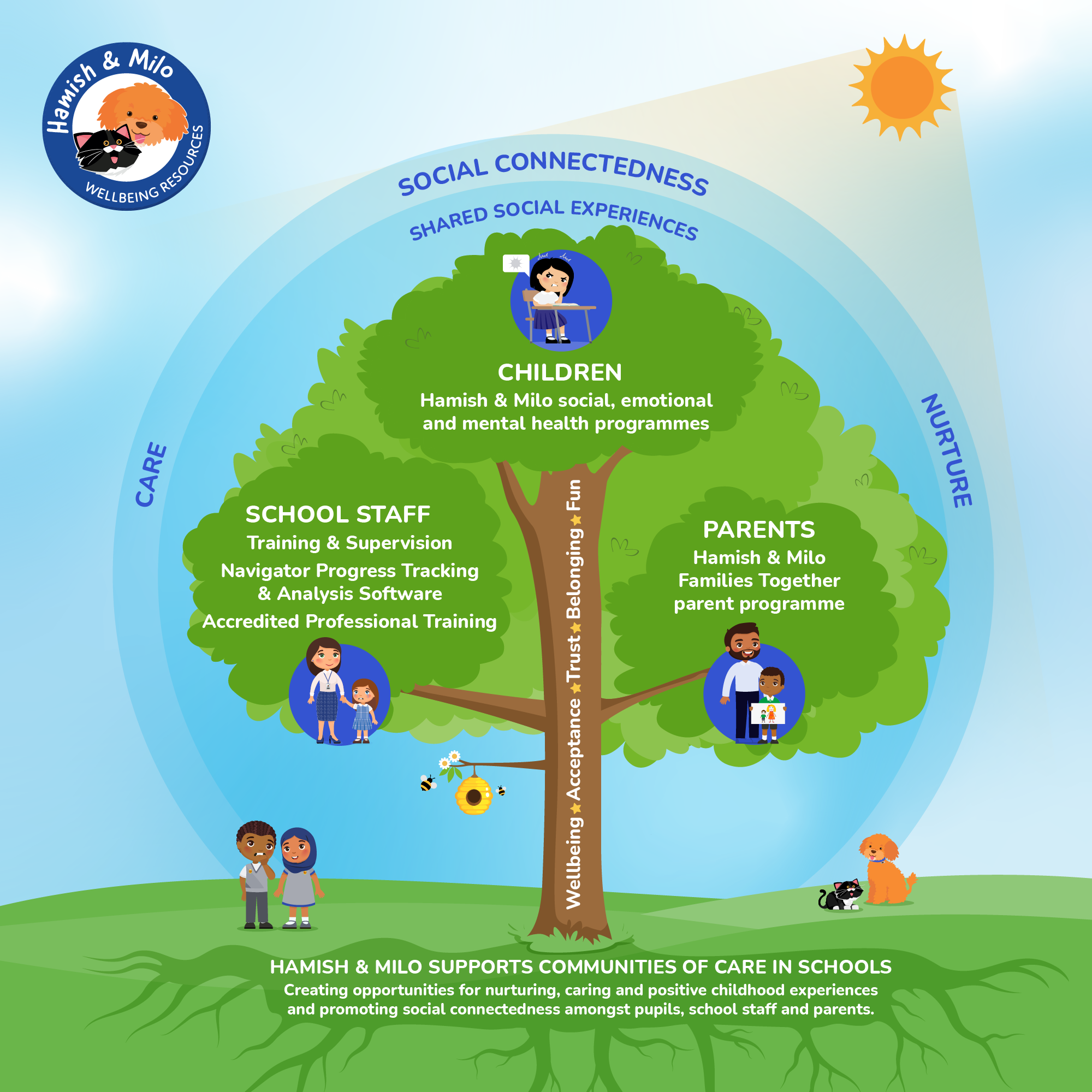Hamish & Milo Families Together case study
“We’re not just supporting the children anymore, we’re growing together as families.”
Hamish & Milo Families Together Programme has proven to be a powerful extension of the core Hamish & Milo Wellbeing Programme.
The family is consistently regarded as the most important social context affecting the emotional health of the child, with the next most influential social context being the school.¹ Well-established research evidence demonstrates that when parents are involved in their children’s education, their children do better on a wide range of measures.² Parent engagement with schools leads to a range of positive outcomes for children, families and schools including improved academic achievement, increased confidence, higher attendance rates, and better overall school culture.³
A seminal piece of research synthesising over 800 meta-analyses relating to achievement published in 2008 concluded that “the effect of parental engagement over a student’s school career is equivalent to adding two or three years to that student’s education.”⁴ Engagement between home and school also benefits parents by enhancing their understanding of their child’s development and boosting their confidence in their parenting skills.⁵ The research clearly demonstrates that the extent to which schools nurture positive relationships with families – and vice versa – is a key factor in positive outcomes for the whole school community.
When educators and families work together, they can build strong connections with each other that reinforce social and emotional skills developed in the home, in schools, and in their communities.
CASEL, 2025 ⁶
The findings of a recently published two-year research study in collaboration with the University of Bath showed that the Hamish & Milo Programme is effective in supporting pupil’s wellbeing and addressing their social, emotional and mental health needs.⁷,⁸ Using evidence-based, standardised clinical measures to assess impact, 1064 children from 92 schools participated in the study with the majority experiencing significant improvements in emotions, behaviours and relationships after participating in the Hamish & Milo Programme.
The study found that the Hamish & Milo Programme promotes social connectedness through shared social experiences throughout the school community, positively impacting pupils, school staff, and parents. By facilitating opportunities that foster social connections, the Hamish & Milo Programme promotes increased acceptance, trust and belonging within the environment of the school community, resulting in a greater sense of care which improves the learning environments for all its members.
Throughout the research study project feedback from school staff delivering the Hamish & Milo Programme highlighted opportunities for further development, particularly around creating additional resources to strengthen implementation and enhance outcomes. During this time school leaders highlighted the need for greater engagement between school staff and parents to enhance the positive outcomes of the Hamish & Milo Programme. In response, the Hamish & Milo Families Together Programme was developed to provide a structured framework for more extensive collaboration between schools and families.
Families Together is a series of ten family workshops directly linked to the ten Hamish & Milo Programme emotion-themed units focussing on the concepts of friendship, resilience, anxiety, diversity/inclusion, angry feelings, transition/change, conflict, loss, sadness and self-esteem. Each week has a different emotion theme focus highlighting the main theory and learning, providing an opportunity to share thoughts, develop a common language, as well as practical techniques and skills that can help better support their child’s wellbeing.
It offers parents, carers, and family members insight into the core programme concepts, theory, content, and approach, as well as builds on the collaborative partnership with the school. It aligns completely with the Hamish & Milo Programme for pupils and provides the opportunity for parents and carers to directly experience the Hamish & Milo Programme, gain insight into what their children are learning, share home-to-school experiences in a safe environment and meet other families to benefit from mutual support.
Central to the programme is the power of the ‘group process’ that changes and evolves as the parents become more familiar with the session format and with each other. Over time, relationships form, and even friendships develop, which enables deeper honest conversations and a sharing of relatable family experiences. This sense of safety and connection fosters belonging and builds a lasting support network among the adults. At the heart of Families Together is the growth and deepening connection between the child and their special family member. The dedicated and meaningful time each week to have fun and enjoy being together also helps to deepen and strengthen relationships and appreciation for each other.
The Families Together programme was first piloted in a primary school in Bristol
Parents of children who had previously attended at least one Hamish & Milo Programme at school were invited to attend Families Together. Each session of the ten-week programme focussed on a different emotion-themed unit and covered the main theory and learning, practical techniques and skills that form the foundation of the Hamish & Milo Programme. At the start of each session, family members met together to talk through key points of the emotion theme, with their child joining at the half-way point to complete an activity alongside them. Each session provided opportunities for the parents and caregivers to share their thoughts and experiences and to develop a common language to help better support their children’s social and emotional development and wellbeing.
To assess the outcomes of the Hamish & Milo Families Together programme, a focus group was conducted with the group of parents who attended the programme to gather their perspectives and insights; and a semi-structured interview was conducted with a Family Support Worker who facilitated the programme on behalf of the school. A focus group is an interdisciplinary qualitative research technique for information gathering, using non-standardised data collection procedures, and based on informal discussion among a group of people selected on the basis of specific characteristics, outlines according to specific research objectives.⁹ Thematic analysis was conducted across the dataset to identify and examine common themes from the participants’ experiences, accounts, and views of the Hamish & Milo Families Together Programme, with the findings summarised below.
What the parents told us
Why the Families Together Programme was needed
- Parents felt that their children have a lot of different needs (e.g. feeling anxious, lonely and lost, low self-esteem) which affects their lives at home and at school and required a different kind of support.
What the Families Together Programme provided that was different or missing previously
- Dedicated, focused, quality TIME and SPACE to connect with their child and other parents, where they could meet and chat about the full range of their experiences.
- A sense of BELONGING and CONNECTEDNESS in shared experiences and understanding.
- A felt sense of comfort in being ACCEPTED for their uniqueness, with no judgement.
- FRIENDSHIPS formed with people they may not have met otherwise.
- A sense of ENJOYMENT in coming together felt by both the children and their parents.
- Parents felt that they gained valuable INSIGHT and opportunities for REFLECTION and SHARING from each session.
The impact of the Families Together Programme
On the parents:
- The sessions helped them be more present with their children, to feel closer to them and to be better parents.
- The programme allowed them to be more reflective about their own childhoods, their relationships, and their parenting.
- Sharing experiences with their children and other parents, where there was a lot of laughter and fun, helped the parents to build deeper relationships.
- Parents really enjoyed the programme and felt grateful, and more optimistic, hopeful, and positive after 10 weeks.
On the children:
- Has had a big impact on their self-esteem, supporting them to develop an emotional toolbox that helps them feel less anxious and more confident.
- They looked forward to their parents coming to the sessions and felt that they were able to open up and enjoy sharing experiences with their parents and others in the group.
Vignettes
Vignettes are brief descriptions rooted in empirical data findings and constructed during data analysis. These descriptions are frequently utilised for the purposes of research communication as they provide vivid, authentic, and evocative accounts of the events with a narrative flow. 10 The vignetted appearing below was relayed by a member of the pastoral team who facilitated the Families Together workshops in a Bristol school.
In conclusion
The findings from this single case study demonstrate that the Hamish & Milo Families Together Programme provides a beneficial extension to the core Hamish & Milo Wellbeing Programme, enhancing its effectiveness by actively engaging families in the social and emotional development process. By creating a space for parents and children to explore key emotional themes together, the Families Together sessions reinforce and deepen the impact of the school-based interventions, supports parents with insight, reflective capacity, and practical strategies to support their child’s wellbeing. When families are included as active partners in this process, the overall outcomes are strengthened – amplifying the sense of connection, belonging, and long-term positive change across the whole school community.

References
¹ CLARK, A., E, , FLÈCHE, S., LAYARD, R., POWDTHAVEE, N. & WARD, G. 2019. The Origins of Happiness: The Science of Well-Being over the Life Course, New Jersey, Princeton University Press.
² HARRIS, A. & GOODALL, J. 2008. Do parents know they matter? Engaging all parents in learning. Educational Research, 50, 277-289.
³ KELTY, N. E. & WAKABAYASHI, T. 2020. Family Engagement in Schools: Parent, Educator, and Community Perspectives. Sage Open, 10.
⁴ HATTIE, J. A. C. 2008. Visible Learning: A synthesis of over 800 meta-analyses relating to achievement, London, Routledge.
⁵ ANNIE E. CASEY FOUNDATION. 2022. Parental involvement in your child’s education: The key to student success, research shows. Available from: https://www.aecf.org/blog/parental-involvement-is-key-to-student-success-research-shows [Accessed 14 December 2022.
⁶ CASEL. 2025. SEL with Families & Caregivers: A systemic approach integrates SEL across all key settings where students live and learn. [Online]. Available: https://casel.org/systemic-implementation/sel-with-families-caregivers/ [Accessed].
⁷ JOINER, R., WADDICOR, A., WILLIAMS, C., MIDDLETON, A., CLARKE, P., HARRIS, S. & ELLIS, M. 2023. University of Bath Research Study with Hamish & Milo: The Emerging Evidence. Dorset: University of Bath.
⁸ JOINER, R., MIDDLETON, A. J., CLARKE, P., WADDICOR, A. & WILLIAMS, C. 2025. They find their voice: Supporting children’s wellbeing and development of social and emotional competencies in the post-pandemic era: A quasi-experimental study on the effectiveness of the Hamish & Milo SEMH Programme
⁹ ACOCELLA, I. & CATALDI, S. 2021. Using focus groups: Theory, methodology, practice, London, SAGE.
10 KLOTZ, S., KRATZER, S., WESTNER, M. & STRAHRINGER, S. 2021. Literary Sketches in Information Systems Research: Conceptualization and Guidance for Using Vignettes as a Narrative Form. Information Systems Management, 39.























